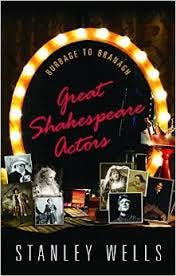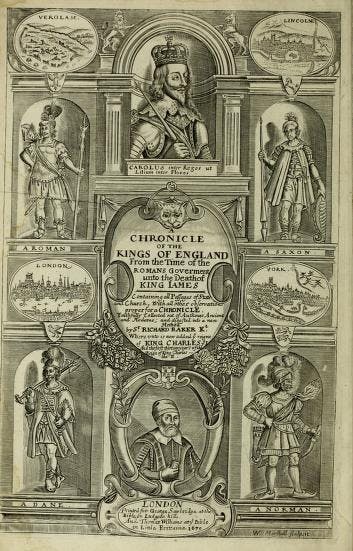We have completely misunderstood Shakespeare. The Bard did not exclusively have actors in mind when writing his plays; he was just as concerned with publishing them.
This controversial position, championed by Lukas Erne in Shakespeare as a Literary Dramatist (2003), introduced new material to an ongoing debate in Shakespeare studies concerning whether we should read rather than see the plays. Some years before Erne, Harold Bloom said that he is “so weary of badly directed Shakespeare that [he] would prefer to attend public readings rather than performances[.]” The opinion connects him with Charles Lamb (1775–1834), essayist and friend of the major Romantic poets. In Lamb’s 1811 essay “On the Tragedies of Shakespeare Considered with Reference to Their Fitness for Stage Representation,” the very idea of performance enrages him. “What has the voice or the eye to do with” the deterioration of Lear’s mind? Nothing at all, he writes: “Lear is essentially impossible to be represented on the stage.” For him, and no doubt Bloom as well, reading Shakespeare is an intellectual pursuit far more enriching than the “juvenile pleasure[s]” offered by the theater.
Stephen Greenblatt (Will in the World: How Shakespeare Became Shakespeare) and other well-respected Shakespeare scholars may not overtly share these opinions, but their work—confined to the classroom—betrays a bias against Broadway and London’s West End. They cannot take all the blame, however; actors as well as directors seem to want little to do with the academe. Columbia University’s James Shapiro (A Year in the Life of William Shakespeare: 1599) is the most notable exception to the rule. An inimitable scholar, Shapiro spent years building relationships with The Royal Shakespeare Company and The Public Theatre and has since become the most outspoken critic of this paradoxical divide.

Now, Stanley Wells offers a fresh, and considerable, challenge to the status quo with Great Shakespeare Actors: From Burbage to Branagh. Wells holds an enviable collection of titles: Honorary President of the Shakespeare Birthplace Trust, Emeritus Professor of Shakespeare Studies (University of Birmingham), and Honorary Emeritus Governor of the Royal Shakespeare Theatre; he is also General Editor of The Complete Oxford Shakespeare and Penguin editions. Even more importantly, however, is that he seems to have seen almost every major (and likely minor) Shakespeare production in England during his long life. This experience puts him in a unique position to determine a shortlist of those actors who have most affected audiences throughout the past 450 years. How they influenced the reception and interpretation of Shakespeare has never been given critical attention, and here, Wells gives them their due.
Thirty-nine men and women make the cut (John Gielgud—of course; Ian McKellen—yes; Mark Rylance—thankfully not). On the surface, the result looks like a reference volume, with each actor given a brief chapter, but his deep relationship with the theater imbues the book with a welcomed personal touch that separates it from similar, less engaging encyclopedic studies. As a result, a natural division forms between the actors he chooses: those he wishes he could have seen and those he will never forget.
Londoners in early modern England (roughly 200,000 in total) were infatuated with the theater. By Shapiro’s estimate, “over a third of London’s adult population [in 1600] saw a play every month.” This was, at least in some part, because of the actors. Shakespeare himself was an active member of The Lord Chamberlain’s Men, one of many acting companies formed in the English Renaissance, though nothing definitive is known about the roles he may have played. The true stars of his group—for whom he likely wrote his most memorable characters—were Richard Burbage, a tragedian, and Will Kemp, a comedian.
Well-known actors like Burbage and Kemp attracted huge audiences, and they were just as hotly desired off-stage. In 1602, a London law student named John Manningham observed the aura surrounding Burbage when he played Richard III: “there was a citizen grew so far in liking with him that before she went from the play she appointed him to come that night unto her by the name of Richard the Third. Shakespeare, overhearing their conclusion, went before, was entertained, and at his game ere Burbage came. Then, message being brought that Richard the Third was at the door, Shakespeare caused return to be made that William the Conqueror was before Richard the Third.” Stardom has changed little throughout the centuries, it seems. Even Sir Richard Baker, a historian well-known for his Chronicle of the Kings of England, opined in 1643 that Shakespeare’s leading man and his rival Edward Alleyn (Christopher Marlowe’s leading man) were “two such actors, as no age must ever look to see the like.”

At the time, Baker could not have known how quotidian such comments would become. Reading the numerous critics gathered together in Wells’s book—Samuel Taylor Coleridge, George Bernard Shaw, and Henry James among them—reveals that such praise has been bestowed on actors across the generations. After seeing John Philip Kemble’s (1757–1823) turn as Coriolanus (a role for which his “inflexib[le] public persona” particularly suited him), William Hazlitt writes that “in embodying a high idea of certain characters, which belong rather to sentiment than passion, to energy of will, than to loftiness or to originality of imagination, he was the most excellent actor of his time.” His Hamlet was even more astounding according to Hazlitt, who revises his opinion by describing Kemble’s “Get thee too a nunnery” scene as “the finest commentary that was ever made on Shakespeare.” Whereas Kemble was “stately” and “statuesque,” his contemporary Edmund Kean (1787?–1833) “acted with the ferocity of an enraged street urchin.” Coleridge famously opined that “To see him act, is like reading Shakespeare by flashes of light.” Hazlitt admired Kean’s talent, too, deeming his Iago “the most faultless of his performances.”
As these examples suggest, very little can be gleaned from hyperbolic adulation—a practice that continues today, with no thanks to the Guardian’s theater critic Michael Billington, who Wells quotes so frequently that he could replace Branagh in the book’s subtitle. Though it is illuminating to learn that Sarah Siddons (1755–1831), possibly the first female Hamlet, “was not less than a goddess, or than a prophetess inspired by the gods” (Hazlitt again) and that Charlotte Cushman (1816–1876) as Lady Macbeth “lost herself in her assumed character,” the fact that each of these actors is lauded with near-equal intensity deadens us to their supposed “greatness.” The inclusion of a few counterpoint examples might have helped—Ethan Hawke comes to mind.
A fresh, livelier voice emerges in the chapter dedicated to Edith Evans (1888–1976). Whether describing the intensity of Evans’ Volumnia (“It was terrifying.”), or his first impressions of Laurence Olivier’s Richard III (“We were off, and I was hooked for life.”), Wells’s own reminiscences exude a child-like excitement. This is not the voice of an academic or even a critic but that of an inspired friend who calls from the theater lobby at intermission. These brief essays are part of a constant search—for his own benefit as much as ours—to define “that degree of special illumination, originality, and communicative power that distinguishes the great from the good.” And while I question whether such ephemeral “creative acts” can ever be formalized, Wells’ passion is infectious.
According to the titular character of Sartre’s play Kean, actors are “shadow[s] in a magic lantern” who become national treasures only if they make “no attempt to live a real life.” Film critic David Thomson suggests that their “need for new roles is oddly akin to promiscuity,” which may relate to the sexual undercurrent of the actor/audience encounter that surely fuels our preoccupation with them. (David Ives’s play Venus in Fur, and Roman Polanski’s film adaptation, play brilliantly with this notion.)In the end, perhaps actors should be ignored all together in favor of acting, because no play (even a one-man show) only concerns the players.
Theater can be unsettling, and it should always be so whenever Shakespeare is concerned. His plays, filled as they are with ambiguities and ambivalences, challenge an audience emotionally, politically, and philosophically, the full effect of which only occurs in the theatre. When Charles Lamb saw a black actor perform as Othello, he was disgusted; in the aforementioned essay, he writes that, when seen onstage, there is “something extremely revolting in the courtship, and wedded caresses of Othello and Desdemona.” Antony Sher (another of Wells’s favorites) was similarly controversial when he and director Gregory Doran brought a mixed-race Titus Andronicus to the Market Theatre in Johannesburg in 1994. In both instances, the very presence of black actors caused outrage. The theater, though always political, was made explicitly so, as racist audience members were compelled to sit silently and confront, and maybe even be seduced by, the objects of their hate.
There is no better example of how seeing a play can affect its interpretation than the abuse we watch Lavinia endure in Titus. The amount of gore varies by director; I once saw a production at London’s Globe Theatre that had a reputation for making audience members faint. But the most devastating moment features no blood at all. By Act 4, Lavinia has already been raped by a pair of brothers, had her hands replaced with sticks, and her tongue cut out. Unable to speak or write, she has not yet disclosed the names of the men who committed these crimes. Her uncle Marcus has the epiphany that his staff can be used as a pencil in the sand and demonstrates this to her. Lavinia mimics him, and, following Shakespeare’s stage direction, “takes the staff in her mouth.” Even if no kinetic memories are triggered by this physical action, Shakespeare’s invocation of the sexual suggests he wants us to consider what might have happened to her; if we turned away from Lavinia’s ravaged body the first time, he now demands we come to terms with her trauma. Contrary to Lamb’s belief, plays are physical as well as psychological experiences, and merely imagining the action restricts us from undergoing those transformations that can only result from intimate encounters with other bodies.
Most theater today affects no change, however; to quote Peter Brook, it “approaches the classics from the viewpoint that somewhere, someone has found out and defined how the play should be done.” This is a safe, boring theater that never challenges “timeless” or “universal” interpretations—interpretations which all sensitive Shakespearians know are meaningless.
True theater is a masochistic art, regardless of the work presented. It requires all who participate to remain open to the possibility of violence—against everything you thought to be true, from your reading of the plays to the most existential beliefs. This is not a call for radicalism for the sake of radicalism alone or for cheap shocks; such tools or tactics may be needed, but only if the moment calls for it. “There is … no such thing as a play,” Wells says. “[T]here are only scripts which come to life in different ways each time they are performed.”
